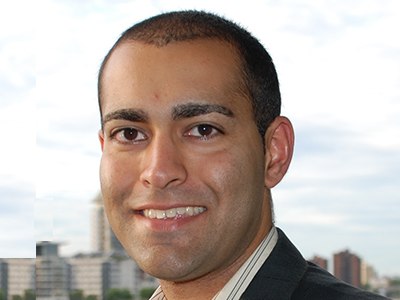Speaker's Corner: Breaking the cycle of despair - tackling diabetes and obesity

Dr Neel Basudev is a London GP and diabetes lead for Lambeth Clinical Commissioning Group. For National Diabetes Week he explains why understanding the person behind the condition is important in weight management to prevent diabetes.
It’s Friday afternoon. You are running 30 minutes late and have another five patients to see. Your next patient was diagnosed with type two diabetes three years ago and has come in for a 10 minute follow up.
His HbA1c (blood glucose level) is steadily rising and so is his weight. Does this sound familiar? Dealing with cases like this in a limited time frame is complex and managing positive behaviour change is one of the key goals for type two diabetes care. The first thing to acknowledge is that this is not going to be an easy task. Realistically and pragmatically, this patient may well be seeing you again in the not too distant future in much the same way. So how can we avoid despondency and worst of all, collusion with the patient? Here are some tips to try and break the cycle of despair:
Use the first consultation to get a flavour of what is important to the patient. Asking them how they feel about their weight and how motivated they feel to doing something about it can save you a lot of energy and effort.
If weight is important to them and they are keen and motivated to address it, then you have an engaged patient in front of you and now is the time to make the most of this opportunity. Asking them what they have tried so far is a useful starting point. It may be that they want quite basic advice to begin with. Whatever message you give, it needs to be consistent. Inconsistency will lead to confusion and this may de-motivate the patient.
At every opportunity, I would recommend promoting structured education to them. Patients who do attend find it interesting and informative. The trouble is that not enough attend. It is important to not just say that you are going to refer them. I find it helpful to have a 30 second blurb prepared outlining what it is called, who does it, what it looks like and how long it lasts for. I also emphasise that to learn about diet and diabetes properly takes more than the 4 minutes I now have remaining in my consultation.
If they are not keen to engage, then don’t be crestfallen. At least the subject matter has been broached and the seeds of thought have been sown in their mind. There may well be other more pressing matters that they want to deal with first such as that aching knee. That’s fine and it is important to acknowledge their choices to maintain a positive rapport.
I sometimes use this opportunity to graphically show the links between weight and glycaemic control. Most patients will have blood tests and weight checks going back over years and it is often interesting for them to see how closely weight gain and glycaemic control mirror one another. Using a graph function on your notes system to demonstrate this as a rising linear or exponential line showing weight gain over the years is quite a clear demonstration tool. It is a fine balance though between being informative and driving further negative thoughts in a patient who has probably struggled for many years to manage their weight. You will need to judge each situation individually.
It is useful to have a robust recall system in place as before the patient leaves, you will ideally want to have a plan of action to prevent another groundhog day moment. This will invariably involve seeing that patient again soon to continue the conversation. Set a clear plan to review progress and keep them engaged.
At all points in the consultation, it is important to remember that we are working with the patient. I often feel that part of our role as health care professionals is to present the facts, dispel the myths and help patients make an informed choice about their health.
Last updated : 19 Jul 2017World Mental Health Day 2021 (20 Oct 2021)
For World Mental Health Day we recorded the advice of LMC Chair Emma Rowley-Conwy on how she has managed workplace stress through the pandemic.Next workforce survey due November 2021 (20 Oct 2021)
Our latest workforce survey will be arriving with practices via email next month, this is the 12th such survey we have had conducted via polling company ComRes. The data gathered from...Abuse of practice staff – October 2021 update (20 Oct 2021)
Our work pushing back against abuse of practice staff continues to be our highest priority. We will soon be meeting with representatives of the Met Police following our letter...Londonwide LMCs' October 2021 Newsletter (20 Oct 2021)
Reminding patients of Pension Credits (19 Oct 2021)
Thousands of London’s pensioners on low incomes may not be getting the Pension Credits they are entitled to, GP practices can help by displaying reminder materials about who can claim....Free training for early career GPs (19 Oct 2021)
Early career and trainee GPs in London are eligible for a free leadership programme provided by Next Generation GP, consisting of workshops and talks running from December 2021 to May...Covid-19 booster shots for practice staff (19 Oct 2021)
Health care workers can now book their Covid-19 vaccination boosters through the National Booking Service (NBS) or by contacting their local PCN site. Staff booster vaccinations can be administered no earlier...Guidance
We provide expert guidance for practices in our guidance section, as well as an archive of other materials you may find useful.
GP Support
Contact our GP Support team if you need help or advice.
The team provide professional and pastoral support to GPs and practice teams on a broad range of issues.

